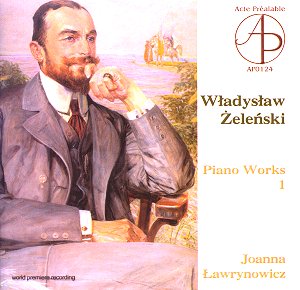Jan Jarnicki’s admirable
– one might say heroic - work in service
of the great Polish musical heritage
has already led him to publish scores
of some of the compositions of Władislaw
Żeleński. He has also issued
at least two previous CDs entirely devoted
to Żeleński – one containing
organ preludes played by Julia Smykowska,
the other a selection of songs performed
by the soprano Anna Michalska-Przybysz
and the pianist Malgorzata Wielgolinska.
Now here is what is labelled as ‘Volume
One’ of the Piano Works.
Żeleński
was born near Krakow and it was there
that he initially studied music,
before advanced studies in Prague and
Paris - finding time along the way to
attain a doctorate in philosophy from
the university of Prague. From 1881
he was director of the Conservatory
in Krakow and a central figure in the
musical life of the city – and the country
– as composer, teacher and conductor.
As a composer his works included at
least four operas, choral compositions,
a symphony, five string quartets and
many songs, in addition to his works
for solo piano.
On the present CD the
young pianist Joanna
Ławrynowicz plays – with considerable
insight – both small and large-scale
works by Żeleński. The programme
includes his second piano sonata, a
work dedicated to Stanislaus Tomkowicz,
one of the great historians of Krakow.
This is a substantial piece in
four movements, on the classical pattern.
It is well made and polished, if perhaps
a bit longer than it need be. The first
movement has some attractive themes
handled in orthodox sonata form. The
adagio is a set of mostly rather stately
variations, the scherzo has some interesting
writing for the left hand. There is
some adroit fugal writing in the final
allegro. The whole is firmly in the
classical/romantic tradition of the
second half of the nineteenth century.
It is enjoyable listening without being
especially individual – one hears echoes
of other composers and nothing happens
to make one sit up in surprise.
The smaller-scale works
elsewhere on the CD similarly suggest
a composer with a pleasant gift for
lyrical melodies and a ‘correct’, rather
conventional harmonic sense. Tracks
3 and 4 consist of two somewhat solemn
pieces which come close to overstaying
their welcome. The Toccata which opens
the programme entertainingly juxtaposes
insistently rhythmic figures and a lyric
grace. The Idyll is appropriately
dreamy and suggestive and is presented
affectionately and convincingly by Ławrynowicz.
One is perhaps most aware of the shadow
of Chopin in the two Mazurkas, particularly
in the sentimentality of the shorter
piece in C sharp minor; the second is
perhaps the more interesting,
in which a heroic theme frames an extended
passage of quiet mysteriousness.
The music on this CD
is not, perhaps, such as to make the
blood race. It is not keyboard writing
which demands fireworks from the soloist
– though it is,
in places, demanding enough. It isn’t
music that startles or surprises by
its individuality. But Żeleński
is thoroughly at home in his chosen
idiom and anyone fond of the piano music
of this period will surely find things
to enjoy in what is on offer here.
Glyn Pursglove
Full
Acte Préalable Catalogue


